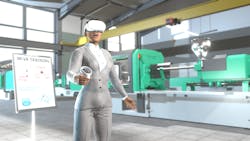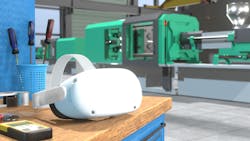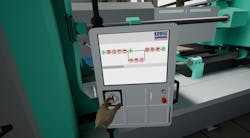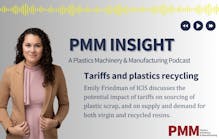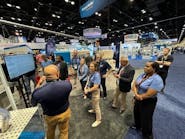By Karen Hanna
Picture this: You’re in a gleaming injection molding plant, with every model of machine you can imagine. You can hit any button, turn any knob, call for more resin, dial down the pressures, or force temperatures all the way up.
Whatever you like, it’s all possible with virtual reality (VR).
At a time when a thin labor market, aging workforce and pandemic have forced manufacturers to get creative, providers of training also have adopted an agile approach to meet the needs of workers short on experience. Companies that offer molding classes say they are trying to meet demand for their services with new classes and new methods.
Recently, at the Plastics Technology Expo 2022 in Chicago, Kruse Training launched its latest endeavor — VR training facilitated using Oculus Quest 2 VR headsets.
“Some of us are capable of reading a book, soaking it up and understanding the matter. Some of us — I would say most of us — like to go through online lessons, where you hear a person talk, where you can be guided through knowledge with animations, with simulations, with striking details of a visualization of a very difficult process,” company President Torsten Kruse said. “That is so key, to have a visual learning experience.”
Kruse and representatives of other companies that provide training said their services help novice employees bridge skills gaps — and give them a reason to stay at companies that have shown interest in investing in their career development. But training isn’t always an easy sell for companies more interested in meeting today’s orders than planning for the future, training providers said.
“I’ve had guys in the class with 20 years; I’ve had guys with one week. And even with some of the guys with 20 years or 30, they don’t know much,” said Umberto Catignani, president at Orbital Plastics Consulting, which offers in-person classes.
That’s an indictment of the training available at some plastics plants, he said.
“I always tell people in the classroom this industry does a terrible job of training.”
Workers take the wheel
Increasingly, training providers said, workers value access to training — and they will find ways to get it, whether their company supports them or not.
“The next group coming in, this future skilled labor becoming skilled, there’s some pretty serious commitment from these folks. I mean, they’re investing in themselves now,” said Todd Bryant, a senior instructor and technical development director for Paulson Training Programs, which has long offered classes available either in person or by computer.
The flexibility Paulson Training Programs offers has given go-getters a way to get ahead.
As an example, Bryant told of a young woman who logged on for classes from 9 a.m. to 5 p.m. before taking off for her night shift at a plastics plant.
“She said, ‘Had it not been for the virtual platform, like what we’re doing, I would not have been able to do this training.’ She was on night shift, and she was able to do the training from the comfort of her home and her own laptop,” Bryant said.
But, Catignani noted, there is still a hunger for hands-on learning opportunities.
“People love hands-on training; that is the best. Running the machine, touching the machine, pushing buttons, doing experiments, showing them how to do it, goes much further than classroom,” he said.
Opportunities for employers
If workers see the value of training, why don’t employers?
While some do, others think only of the initial cost, the training providers said.
“I’m like, ‘Well, you know, this guy just bought, let’s say … a 500-ton molding machine, he buys a mold, all the auxiliaries, he’s well in over a million dollars, probably, right? Depending on the complexity and stuff. And there’s this hesitation to train someone how to really use this equipment. You’ve made this big investment, but … you want to pay someone $12 or $15 an hour, like a minimum wage, to run this,” Catignani said. “It almost seems crazy.”
Training providers said companies would benefit from focusing on the return on investment instead.
“You should be really considering training as a means for recruitment, or for onboarding,” said Michelle Parr Paulson, director of marketing communications for Paulson Training.
With workers in short supply, training is one way to not only grow a workforce, but retain it, Catignani and the other training providers said.
Kruse Training Programs, for example, provides unique login information for each student who accesses its 15- to 25-minute, anytime/anywhere online classes, and students can monitor their own progress, as well as the progress their colleagues are making. The experience, Kruse said, is motivating for workers.
“That is a huge morale boost for each individual; it has a tremendous effect,” he said. “The second effect is that these companies use the system to not only train, but also to sustain and to promote individuals in the company. They will very quickly realize who from their staff is really interested in learning. Some of [the workers] will just say, ‘OK, I’m going to look at it if I have to,’ and some of them, they are very eager to learn, and they soak it up like the sun in Florida.”
To help its customers identify their workers’ needs, Paulson Training Programs tests each new student, to assess what he or she already knows.
With those insights, Paulson Training Programs can spot weaknesses — and pick out workers who might have more potential than they have so far shown.
“They can identify ... ‘Wow, this person, they might be working in front office, but you might want to have them working on the plant floor because they clearly have [aptitude].’ And, so, there’s been some uncovered gems at companies,” Paulson said.
The costs of training beat the costs of not training, Kruse and the other providers said.
“I believe that eventually, if engineers that are supposed to work on $800,000 equipment … these type of training classes will be made mandatory, as well,” Kruse said.
As he looked forward to being able to unlock all the potential that VR offers, Kruse said the industry will benefit from technologies that allow workers — both new and experienced — to visualize the possibilities for their own careers. The VR world, he said, “is open and endless.” As Kruse Training continues to build out its VR offerings, it is an impression he hopes workers will get from the plastics industry itself.
“We will use this as a launching pad to really show individuals that are new to injection molding, ‘Let’s go into a mold [cell]. Here, we’ll show you around what the molding facility will look like. We’ll go from the outside into the building, look [over] a molding room, [provide] some explanation, and then enter the molding room, look at machines, what they look like, how they are operating, look at the tool cart for a process engineer, open the drawers and see what kind of tools they are working with on a day-by-day basis,’ ” Kruse said. “ ‘Take a tour of the finished product, the warehouse, where we keep all of our materials necessary for a molding facility, from materials to silos to additional peripheral devices.’ ”
Eventually, he said, Kruse Training’s VR offerings could include visualizations of everything from the tools in one work drawer or molding cart to the molding setup on a press and all the auxiliary equipment that supports it. The company also continues to grow its more-conventional offerings — the number of traditional classes, which stood at 96 a few months ago, will soon hit 106, Torsten Kruse said.
With the experiences, students can realize, “Hey, this is a high-tech industry. This is not a simple manufacturing process; it is a really complex manufacturing process that can have significant rewards for you from a monetary [perspective] but also for their own engineering development,” Kruse said.
Karen Hanna, senior staff reporter
Contact:
Kruse Training Inc., Naples, Fla., 239-351-7428, https://krusetraining.com
Orbital Plastics Consulting, Atlanta, 404-849-6714, www.orbitalplastics.com
Paulson Training Programs Inc., Chester, Conn., 860-526-3099, www.paulsontraining.com
Karen Hanna | Senior Staff Reporter
Senior Staff Reporter Karen Hanna covers injection molding, molds and tooling, processors, workforce and other topics, and writes features including In Other Words and Problem Solved for Plastics Machinery & Manufacturing, Plastics Recycling and The Journal of Blow Molding. She has more than 15 years of experience in daily and magazine journalism.
